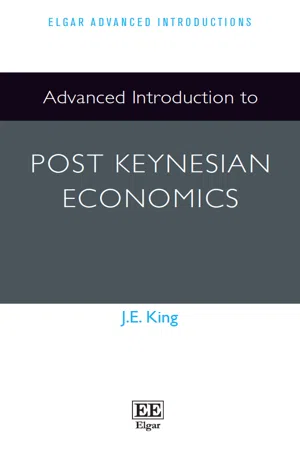
- English
- PDF
- Available on iOS & Android
Advanced Introduction to Post Keynesian Economics
About this book
Elgar Advanced Introductions are stimulating and thoughtful introductions to major fields in the social sciences, business and law, expertly written by the world's leading scholars. Designed to be accessible yet rigorous, they offer concise and lucid surveys of the substantive and policy issues associated with discrete subject areas.This brief but comprehensive account of the Post Keynesian approach to economic theory and policy is ideal for advanced undergraduate and postgraduate students in economics, public policy and other social sciences. Clear, non-technical and with a strong policy focus, it will also appeal to all of those who are dissatisfied with mainstream economics and wish to explore the alternatives. John King sets out the distinctive features of Post Keynesian economics and their implications for the assessment of alternative proposals for domestic and international macroeconomic policy. He begins by outlining the core elements of Post Keynesian theory and explains how it differs from other schools, including the so-called 'Old Keynesian' and 'New Keynesian' theories. Subsequent chapters deal with the important methodological issues that distinguish the Post Keynesians from mainstream economists, in addition to their treatment of firms, workers and households, the analysis of economic growth and development, as well as international economics. The Post Keynesian approach to monetary and fiscal policy, incomes and the environment is also summarized, with particular attention being paid to controversies over austerity and the reform of the financial sector and international monetary system. The Global Financial Crisis of 2007–2008 is used as a case study to illustrate many of the significant theoretical and policy questions raised in previous chapters. The relationship between Post Keynesian and other branches of heterodox economics are explored, and the book concludes with a brief discussion of the future prospects for the Post Keynesian school.
Frequently asked questions
- Essential is ideal for learners and professionals who enjoy exploring a wide range of subjects. Access the Essential Library with 800,000+ trusted titles and best-sellers across business, personal growth, and the humanities. Includes unlimited reading time and Standard Read Aloud voice.
- Complete: Perfect for advanced learners and researchers needing full, unrestricted access. Unlock 1.4M+ books across hundreds of subjects, including academic and specialized titles. The Complete Plan also includes advanced features like Premium Read Aloud and Research Assistant.
Please note we cannot support devices running on iOS 13 and Android 7 or earlier. Learn more about using the app.
Information
Table of contents
- Cover
- Copyright
- Contents
- Acknowledgements
- 1 Introduction
- 2 The core of Post Keynesian economics
- 3 What Post Keynesian macroeconomics is not
- 4 Some methodological issues
- 5 Post Keynesian microeconomics
- 6 Economic growth, development and the world economy
- 7 Why it all matters: economic policy
- 8 A case study: the Global Financial Crisis
- 9 Post Keynesians and other schools of thought
- 10 Some final questions
- Index